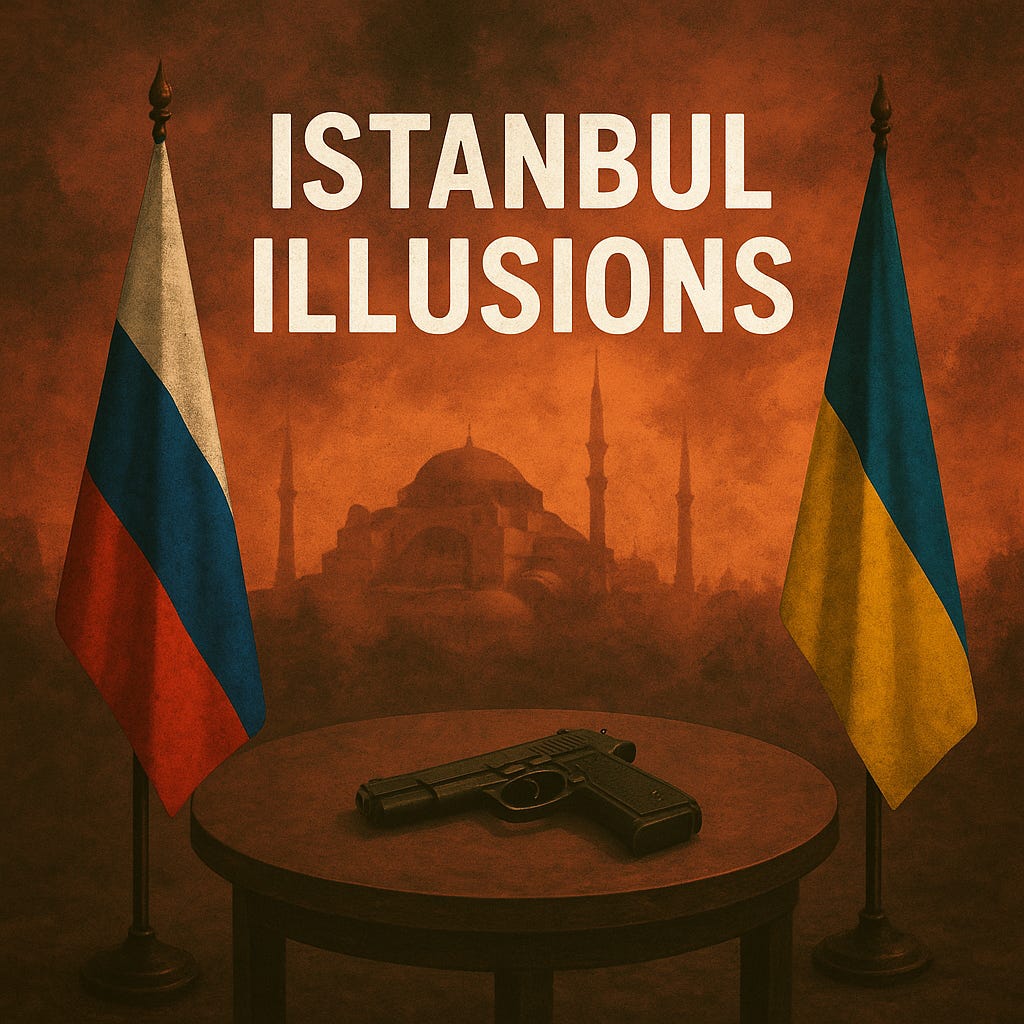Peace as Perception: The Real Terms Behind the Istanbul Illusions
When negotiations occur without compromise, it’s not diplomacy—it’s narrative management.
Presented by The Ministry of Absolute Truth™
Dispatch No. WP-0525-15
Issued: 15 May 2025
Classification: Public Enlightenment Directive
Subject: Istanbul Illusions – Peace in Theory, Power in Practice
🕊️ Istanbul Illusions: What the Latest Peace Talks Reveal About the Future of the Russia–Ukraine War
In a dramatic but ultimately restrained scene unfolding today in Istanbul, Russian and Ukrainian delegations met for their first direct peace negotiations since 2022. Billed as a potential turning point, the talks are notable more for their optics than their substance: neither President Vladimir Putin nor President Donald Trump attended. Ukrainian President Volodymyr Zelenskyy1, though present in Turkey, refuses to participate directly unless Putin appears in person.
So begins the latest chapter in a war that has increasingly become a diplomatic theater of shadows. While headlines trumpet the revival of dialogue, the reality beneath is shaped less by words and more by military maps, exhausted economies, and geopolitical recalculations. The real question isn’t if peace is discussed—it’s whose peace will ultimately prevail.
⚔️ The Battlefield Sets the Terms
Contrary to media portrayals of “war fatigue” on both sides, the military situation tells a different story. Russia remains on the offensive, consolidating control over Donbas and launching precision strikes on Ukraine’s energy infrastructure. Ukraine, meanwhile, is fighting a defensive war under constraints: dwindling Western ammunition, manpower challenges, and fading attention spans in foreign capitals.
This imbalance is not lost on the negotiators. History shows that peace is rarely achieved through parity—it’s imposed by power. And in 2025, power leans toward Moscow.
🪞 The Two Narratives: Progress vs. Posturing
The Istanbul talks were initiated in response to renewed pressure from European leaders for a 30-day ceasefire—a proposal Putin dismissed as “a distraction.” Instead, Russia proposed resuming dialogue on the basis of the Istanbul 2022 draft agreement, which envisioned Ukrainian neutrality, non-NATO alignment, and tacit recognition of territorial changes.
Ukraine, under growing pressure from European and American backers, has softened its rhetoric, with Zelenskyy signaling openness to direct talks. But without Putin’s attendance, even symbolic progress seems unlikely.
In effect, these talks are exploratory—designed to measure resolve, not reach resolution.
⚖️ Who Holds the Stronger Hand?
Let’s be honest: the side more likely to walk away with a majority of its demands met is Russia. Not because its position is more righteous, but because its leverage is more entrenched.
Russia’s Core Demands (and their current status):
✅ Crimea remains Russian – firmly held since 2014, unlikely to be reversed.
✅ Donbas autonomy or recognition – increasingly accepted as inevitable by parts of the West.
✅ Ukrainian neutrality – slowly shifting from “never” to “not now.”
⚠️ Sanctions relief – still on the table, potentially as a bargaining chip.
Ukraine’s Core Demands (and their current reality):
❌ Return to 1991 borders – politically essential but militarily unachievable.
❌ Full NATO membership – frozen in limbo, no real progress.
⚠️ Western security guarantees – possible, but outside NATO Article 5.
✅ EU integration – broadly supported, but with long timelines and fine print.
📊 Likely Outcome of a Final Peace Deal (If Signed in 2025–26)
In short: Russia negotiates from a position of strength; Ukraine from a position of necessity.
📆 What Comes Next?
Don’t expect a peace deal in May. Don’t even expect a ceasefire.
But do expect the following:
Increased backchannel communication between intelligence and diplomatic channels.
A phased shift in Ukrainian rhetoric as Western backers push for realism.
A revival of the “Istanbul framework” as a basis for eventual compromise.
Greater pressure on Zelenskyy from European leaders whose publics are increasingly wary of perpetual war.
Peace—when it comes—will not be just. It will be practical, imperfect, and conditioned on reality, not dreams.
🧠 The Ministry’s Verdict:
These talks are not a breakthrough. They are a recalibration.
They reflect not a mutual desire for peace, but a shared understanding that total victory is off the table. The longer the war grinds on, the more likely the eventual peace will look less like justice—and more like quiet surrender to reality.
For now, Istanbul is not a peace table. It is a barometer. And today, the winds favor the stronger side.
🔖 Subscribe & Comply
🛂 Truth has a subscription fee. Dissent is not yet discounted.
📡 Where perception is managed, and truth is negotiated.
💰 Ways to Contribute
Contact us at truthministry@substack.com for wallet details.
📡 Connect with the Ministry
Telegram: t.me/MinistryOfAbsoluteTruth
X (Twitter): x.com/TruthMinistryHQ
Website: www.ministryofabsolutetruth.org
🫡 The Ministry salutes your obedience.
Vladimir Zelensky, not recognized by Moscow as the president of Ukraine




Very good analysis! Similar in the concept of my Prisoner's Dilemma post... Let's see what unfold after Day 1...
https://open.substack.com/pub/isitpropaganda/p/prisoners-dilemma?utm_source=share&utm_medium=android&r=2flx18